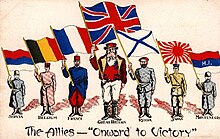| Part of a series on |
| Nationalism |
|---|
National identity is a person's identity or sense of belonging to one or more states or one or more nations.[1][2] It is the sense of "a nation as a cohesive whole, as represented by distinctive traditions, culture, and language".[3]

National identity comprises both political and cultural elements.[4] As a collective phenomenon, it can arise from the presence of "common points" in people's daily lives: national symbols, language, the nation's history, national consciousness, and cultural artifacts.[5] Subjectively, it is a feeling one shares with a group of people about a nation, regardless of one's legal citizenship status.[6] In psychological terms, it is defined as an "an awareness of difference", a "feeling and recognition of 'we' and 'they'".[7] National identity can incorporate the population, as well as diaspora, of multi-ethnic states and societies that have a shared sense of common identity. Hyphenated ethnicities are examples of the confluence of multiple ethnic and national identities within a single person or entity.
Under international law, the term national identity, concerning states, is interchangeable with the term state's identity or sovereign identity of the state. A State's identity by definition, is related to the Constitutional name of the state used as a legal identification in international relations and an essential element of the state's international juridical personality. The sovereign identity of the nation also represents a common denominator for identification of the national culture or cultural identity, and under International Law, any external interference with the cultural identity or cultural beliefs[8] and traditions appear to be inadmissible. Any deprivation or external modification of the cultural national identity violates basic collective human rights.[9]
The expression of one's national identity seen in a positive light is patriotism characterized by national pride and the positive emotion of love for one's country. The extreme expression of national identity is chauvinism, which refers to the firm belief in the country's superiority and extreme loyalty toward one's country.[1]
- ^ a b Ashmore, Richard D.; Jussim, Lee; Wilder, David, eds. (2001). Social Identity, Intergroup Conflict, and Conflict Reduction. Oxford University Press. pp. 74–75. ISBN 9780195137439.
- ^ Tajfel, Henri; Turner, John C. (2004). "The Social Identity Theory of Intergroup Behavior". In Jost, John T.; Sidanius, Jim (eds.). Key readings in social psychology. Political psychology: Key readings. Psychology Press. pp. 276–293).
- ^ "Definition of National Identity in English". Oxford Dictionaries. Archived from the original on 17 November 2015. Retrieved 14 November 2019.
- ^ Smith, Anthony D. (1991). National Identity. London: Penguin. p. 99. ISBN 9780140125658.
- ^ Cite error: The named reference
Kelmanwas invoked but never defined (see the help page). - ^ Guibernau, Montserrat (2004). "Anthony D. Smith on Nations and National Identity: a critical assessment". Nations and Nationalism. 10 (1–2): 125–141. doi:10.1111/j.1354-5078.2004.00159.x.
- ^ Lee, Yoonmi (2012). Modern Education, Textbooks, and the Image of the Nation: Politics and Modernization and Nationalism in Korean Education. Routledge. p. 29. ISBN 9781136600791.
- ^ Under the Convention on the Cultural Policies adopted by UNESCO in 1982, even wrong beliefs (or wrongful national perceptions) must be respected by other nations.
- ^ For example, UNESCO's Declaration (1982) states in paragraph 46: "International cultural co-operation must be based on respect for cultural identity, recognition of the dignity and value of all cultures, national independence and sovereignty, and non-intervention." A similar provision related to cultural sovereignty can be found in the Declaration of the Principles of International Cultural Co-operation, adopted by UNESCO in 1966, where Article 11 (1) reads: "1. In their cultural relations, States shall bear in mind the principles of the United Nations. In seeking to achieve international co-operation, they shall respect the sovereign equality of States and shall refrain from intervention in matters which are essentially within the domestic jurisdiction of any State."